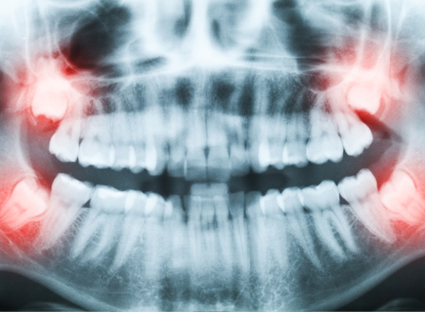WISDOM TEETH EXTRACTIONS &
SURGICAL EXTRACTIONS
If a tooth has some damage from decay or is broken, your dentist would try their best to save that tooth for you with either a filling or a crown (cap). But sometimes when the tooth is too far gone the only treatment option is an extraction or removed from the jaw.
Common reasons for teeth to be taken out include:
- Damage beyond repair from decay
- Extra teeth that block other teeth from coming into its correct position
- Baby teeth that won’t fall out
- Cancer treatment with radiation in the head and neck area
- Patients receiving cancer drugs
- Wisdom teeth (third molars) which erupt in the late teens
- Loose teeth that have been affected by gum disease

There are 2 types of extraction procedures:
- Simple extraction: where your dentist will administer local anaesethetic, and once the tooth is numb wiggle it out with instruments called elevators and forceps. You may experience lots of pressure and pushing which is all quite normal.
- Surgical extraction: This is a more complex procedure which is usually done when the tooth cannot be removed easily because it is under the gum line or has not fully erupted in the mouth (usually wisdom teeth). The dentist will make an incision on the gum to expose the tooth. Sometimes it may be necessary to free the tooth by removing the surrounding bone around the tooth and divide the tooth into fragments for easy removal.
Extractions can cause some mild to moderate discomfort, the best way to deal with this is to take the recommended pain killer suggested by your dentist before the numbness goes away, and then continue for the next 3-4 days. Surgical extractions are generally more uncomfortable and the level of post-op discomfort depends on how difficult it was to remove the tooth. Most people recovery fully after one week.
To minimise your discomfort:
- Ice packs can be used to reduce swelling, we suggest 20 minutes on and then 20 minutes off.
- Eat soft foods
- Gentle rinsing with warm, salty water 24 hours after the surgery.
- Avoid spitting, smoking and alcohol for at least 48 hours.
- Sometimes stitches are placed which can either dissolve, or may require removal of the stitches at another appointment.
Sometimes wisdom teeth removal can be quite difficult and in those cases you may be referred to an oral and maxillofacial surgeon for removal of wisdom teeth.
